It must be true, because the internet said so.
I’m not quite up to thinking too hard yet, but I thought I’d make the effort to do my weekly Auē a Tau Kē Tēnei Wiki posts anyway. In an experiment to see whether God would intervene in the heresy of an atheist taking the test, I decided to have a go at this one:
Obviously, I disagree with the first statement, but having never seen evidence saints don’t exist, I have to be open to the possibility they do.
The first question proved to be problematic though:
Saints aren’t important to me. However, I never pray either. I decided to go with the third option though – I was a Presbyterian before I was an atheist, so there’s a history there of not approving of praying to saints. I also reasoned that this test was about the saint, not God, so number three was the closest to my opinion.
Question two was much easier:
“No, not yet,” was the choice here.
Question three posed some difficulties again:
I don’t pray. I do the sort of meditation that’s supposed to help with pain relief sometimes, and there are certainly times I am in awe, or consumed by wonder, at various aspects of our natural world. Just a couple of days ago I spent a lot of time being amazed as I watched the third set of the match between Roger Federer and Novak Djokovic at the Australian Open. The tennis from both men was just incredible. Anyway, I went with “I pray another way.”
Question four presented a hypothetical situation for me:
This is a situation I’ve never come across as an adult, which I didn’t realize until I took this test. There was one beggar for a few years (about five) in the city I grew up in, and everybody knew who he was, and how to handle him. Sometimes I gave him money, sometimes I didn’t. It rarely got cold in my home town, but when it did, the Police gave him a bed for the night. Otherwise he insisted he preferred to live in the streets. So I chose the “I give him some change” option.
Question five was easier, although the reasoning behind my answer was probably not what the makers of the survey had in mind:
I, of course, chose “Something else.” Option one, a sense of community, sounds good on the surface, but it is also about creating an in-group and an out-group, thereby unnecessarily dividing people. If someone chooses option two they think religious faith means they don’t have to be afraid of anything. That’s worrying. If they were afraid before, they’ve been given a false prop which, because it’s false, could be knocked from under them at any time. It may also mean they’re been preyed upon by one of the more extreme religions.
Option three in particular (“That it makes me a better person”) is one that atheists find both offensive and scary. If the only reason you are good is because you’re either scared of divine retribution of looking for divine reward either here or in the afterlife, you’re not really a good person at all. It also comes with the sub-text that you have to be religious to be moral and worse, that those who aren’t religious are also immoral.
Option four – always being able to turn to God – is a bit of a concern too. While I can understand it, it’s also not reliable as an emotional prop because it’s not real. It’s better, I think, to teach someone how to draw on their inner resources to cope in times of trouble.
Question six was easier:
I like Christmas Day best, because throughout my life it’s almost always been a happy day, so I went with “Another holiday not listed here.”
Question seven was surprisingly difficult:
I think all those things are important, and more. One of the things that is important to me is the advancement of rationality over superstition, so that people don’t rely on things like patron saints. Women’s rights is really important to me too, as is education for all. I can’t choose just one thing, so plumped for “Something else.””
The last question was the easiest of the lot:
Obviously, I don’t expect anything from him. Since I don’t think there’s anybody, sanctified or otherwise, looking down on us, I can’t imagine I’d get any help from such a being even if he existed.
A few seconds later, my result was calculated:
The blurb, in case you don’t carry a magnifying glass:
Francis from Assisi was a happy person who didn’t worry too much. He took care of people with such great patience and enchanted people with his kind nature. Francis proved how important social commitment is for a peaceful community. You, as well, so remarkable things for others, supported by your patron saint Francis of Assisi. You’ll be rewarded for it! Which patron saint watches over your friends? Share this test now so that they can find out!
So here you go. It’s your turn now. Click here to find out who your patron saint is. If you take the test, let us all know how you got on in the comments below.
I suspect most atheists will answer similarly to me. Does that mean Francis of Assisi if the patron saint of atheists?


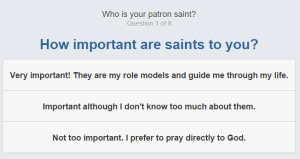
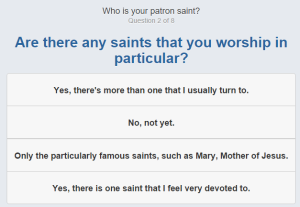
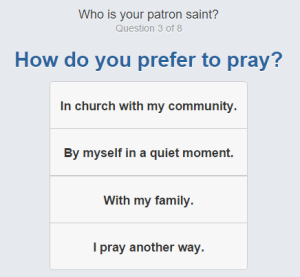
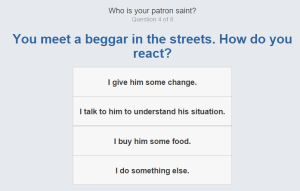
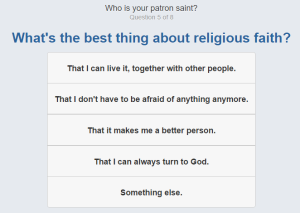
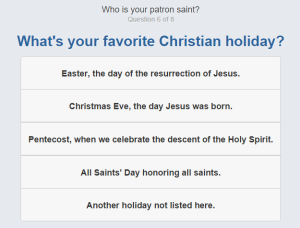
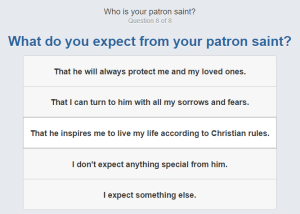
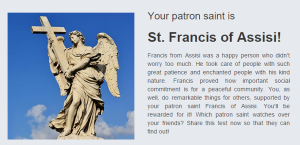
Well, just to be different I decided to go with what I thought would be the most likely to be chosen answers of hard-core fundamentalists. I was hoping for someone like “Saint Sulpitius the Pious” (had to look that one up), but instead got the rather insipid:
Why do I suspect that every patron saint this test leads to will be similarly innocuous?
Not only innocuous, but a man. Wouldn’t want someone who thinks he, as a man, should lead the household get one of the strong women saints. I’d love to see someone like Ralph Reed (Faith and Freedom Coalition) or Rick Santorum get Hildegard of Bingen for example. 🙂
Ha, ha, great point! I should have thought of that myself. Wow, old Hildegard looks like one of the better ones, from that link anyway.
Hi Heather, Since I am an atheist/secular-humanest/anti-capitalist/pro-socialist, etc, etc, type of person, I find all this talk of saints very peculiar indeed. While people are entitled to their madness’es and superstitions, at least until they become dangerous to others, I still find a belief in sky-fairies and all their accouterments (such as saints, demons, holy books, whatever) very disheartening and hope someday people will become more rational.
Amen and hallelujah! 🙂
I think I took the wrong test. My results: “When you are in love you are like a Lion! Lions act completely based on their feelings. They show openly that they covet their potential mate, and not just to them directly, but to the whole world with loud expressions of love. They do not put up with rivals but do their best to win once and for all.”
Anyway, why would an atheist object to saints as role models? Many saints demonstrate universal virtues that aren’t specific to a particular creed.
Admittedly, I don’t get the atheist mindset at all, but I’m not sure I follow your reasoning on Question 5, or why the options given would be worrying.
Building community has nothing to do with dividing people (although those who want to sow division usually find a way to succeed).
It seems perfectly natural that knowledge overcomes fear. The more one grows in knowledge of God and of truth, the less room there remains for fear.
I believe perhaps you misconstrued the option about “a better person”. Of course the whole point of faith is to become fully alive, to seek after the best version of oneself and thereby glorify the Creator.
One can always draw on inner resources, but true peace and joy come from developing gratitude for those gifts.
LOL – you’re going to have to change your name or avatar!
It’s not about role models – I said in another comment there’s much I admire about Hildegard of Bingen for example. It’s about, as the test said, having someone watching over you, someone to pray to etc.
As we’ve discussed before, you’re a Sophisticated Theologian – your way of expressing your faith is not typical, and there’d probably be a lot less division if more were like you.
From an atheist’s point of view, things like inner peace aren’t “gifts,” they’re things anyone can develop. The concept of a Creator isn’t necessary for spiritual feelings (though I hate the word spirituality and avoid using it because it has religious connotations).
As an out and out atheist I have no time for saints of any kind, but took the test anyway for a laugh and came up with St Anthony of Padua.
I’m starting to think they have a list of (as Diane describes them) “innocuous saints” that are applied at random!
I think you are right there, I filled in all the questions like you and it came up with St Martin of Tours!
I got St Paul. I voted for Christmas Eve as my favourite Christian holiday – I love a good Saturnalia (without the human sacrifices, of course).
PS I always thought that Jesus was allegedly born on Christmas day, not Christmas Eve. In fact, if he was born on Christmas Eve, would that not make it “Christmas Day”?!
16 June 4 BC seems be a popular date of scholars, always assuming he actually existed of course. One thing’s for sure, there wouldn’t have been any shepherds watching their flocks by night in the northern hemisphere in late December.
I vaguely remember reading that it was an attempt to bring about good behaviour at Saturnalia that led the Christians to celebrate the birth of Jesus at that time of year – good confirmation of the immoral atheist myth! 🙂
“I always thought that Jesus was allegedly born on Christmas day, not Christmas Eve.”
You & me both. Heather, I think you missed HFB’s point. 🙂
You’re right!
Sorry HFB – I spoiled the punchline 🙁
Feel free to tell me I’m a fu*kwit – but only once! 🙂
No worries, Heather, and thanks Diane. Of course, I doubt the man even existed, and the chances of being able to pin down his date of birth are about 365:1.
BTW, I’m finding your USA election posts fascinating – please keep up the good (and hard) work. It’s a dirty job, but…
Cheers! 🙂
Actually that’s an idea – maybe alcohol would help?
And now, back to breakfast. That baby must be nearly ready by now (I like them rare) 🙂
It would be interesting to see cumulative results of all who took the test. Not a random sample, but still of interest.